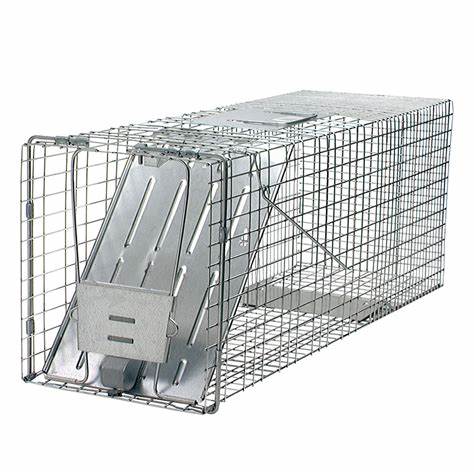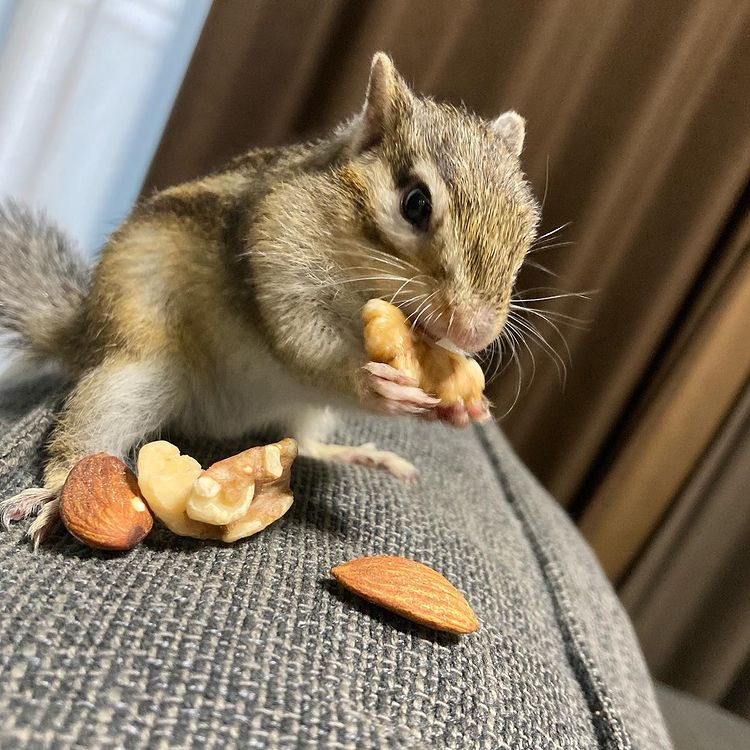Unwanted ground squirrels wreaking havoc in your backyard? Dealing with ground squirrels can be quite a challenge, especially when they start invading your garden, digging up your yard, or causing damage to your property.
These critters are known for their agility, adaptability, and prolific breeding, making them a persistent nuisance. Fortunately, several humane and practical methods to manage and get rid of ground squirrels without resorting to harmful measures exist.
Say goodbye to their mischief with these foolproof strategies! Learn how to reclaim your space and bid farewell to those pesky ground squirrels.
How To Get Rid Of Ground Squirrels In Your Yard
When prevention measures aren’t enough, it is time to use elimination strategies. These are:
a) Trap and Relocate
Manage the population of ground squirrels on your property with live traps designed specifically for squirrels. Place the traps strategically in areas frequented by ground squirrels, such as burrow entrances or along their pathways.
Entice them to get into the traps by placing the bait (nuts, seeds, or peanut butter) at the trap’s far end to ensure the squirrel fully enters it.
Check the traps every few hours to see if any ground squirrels have been captured. If they have, carefully pick up the trap and transport it to the relocation site, preferably several miles from your property. Approach the traps cautiously and handle them with thick gloves because frightened squirrels can try to escape or bite.
Upon reaching the relocation site, open the trap door gently to allow the squirrel to exit. Make sure the release site provides adequate food, shelter, and safety for the squirrel. Avoid releasing them in areas where they may struggle to survive or compete with existing wildlife for resources.
b) Use Natural Predators
You can solve your ground squirrel problem by introducing other animals to your property. But not just any animal; you want the natural predators of ground squirrels.
Create an inviting environment for predator species by installing birdhouses or owl boxes on your property to attract birds of prey like owls or hawks. These structures provide shelter for these predators, encouraging them to frequent your home.
Also, incorporate native plants and trees that provide shelter and food sources for predator species. Keep dense shrubs, trees, and tall grasses, as they can serve as hiding spots for predators as they hunt for ground squirrels.
Natural predators, like raptors, may frequent areas with accessible water for drinking and bathing, so ensure a water source is nearby. In addition, refrain from using pesticides or chemicals that could harm or deter natural predators.
Related Posts:
c) Try Decoys
If you would rather not have other animals on your property, even if they are ground squirrels’ natural predators, consider using decoys to deter them instead.
For example, predator decoys mimic the natural predators of ground squirrels, such as owls or hawks. Place them in visible locations to intimidate squirrels.
In contrast, scarecrows or scare devices with human-like features can startle ground squirrels and make them wary of the area. You can also deter ground squirrels by strategically placing mirrors or reflective objects around your property.
d) Plant Deterrents
You can also keep ground squirrels away from your home by planting plants they dislike. For instance, ground squirrels tend to avoid daffodils due to their toxic bulbs, allums because of their pungent odor, and fritillaries because they emit a scent that repels rodents.
Similar to daffodils, hyacinths contain substances that squirrels tend to avoid. Herbs like mint and rosemary have strong scents that can deter squirrels.
To make this strategy more effective, combine it with other control methods, such as fencing or repellents.
e) Instal Motion-Activated Devices
Hazing can also be effective against ground squirrels because they will keep off your property if you bother them. You can do so by setting up motion-activated devices where squirrels are active or where you want to prevent their presence, such as gardens, flower beds, or entry points.
Some types of motion-activated devices to consider include:
- Ultrasonic Repellers: These emit high-frequency sound waves unpleasant for ground squirrels and other pests, causing them to avoid the area.
- Sprinkler Systems: The presence of squirrels triggers motion-activated sprinkler systems, spraying water for a short duration, startling the squirrels, and encouraging them to leave the area.
- Lights and Sound Devices: Some devices combine flashing lights with loud noises or ultrasonic sounds. The sudden activation of these elements can startle squirrels and discourage them from staying in the area.
- Ultrasonic Pest Repellent Stakes: These stakes emit vibrations or ultrasonic sounds into the ground, creating an unpleasant environment for ground-dwelling pests like squirrels.
Note
Occasionally, move the devices around to prevent the ground squirrels from getting used to the deterrent. Also, ensure the device you pick can withstand outdoor conditions and regularly recharge it or replace its batteries.
f) Try Pepper Spray
This is an affordable, easy to make and use, non-toxic, and effective method against a ground squirrel infestation. The downside is it requires manual reapplication and can irritate humans and pets.
- Soak red pepper flakes (a cup) for 12 hours inside hot water (a cup)
- Add some dish soap, followed by a pint of water.
- Strain the mixture into a spray bottle.
Alternatively, look for a pepper spray or deterrent specifically designed for use against small animals like ground squirrels. Some sprays are formulated to deter animals without causing them harm.
Apply the pepper spray in the areas frequented by squirrels or where you want to deter them. Focus on entry points or areas where they are causing damage. Reapply as needed.
g) Castor Oil
Castor oil’s strong smell and taste can discourage ground squirrels from foraging or digging. Like pepper spray, castor oil is affordable and easy to make and use. It is also humane, but it can affect your pets and requires regular application to be effective.
- Mix castor oil (1/4 cup) with dish soap (two tablespoons)
- Mix two tablespoons of this mixture into water (a gallon), then spray or pour it directly onto the soil where ground squirrels are active or causing damage. Focus on areas where they dig or where you want to prevent them from foraging.
- Reapply the castor oil solution after rainfall or irrigation.
Prevention Measures
Prevention typically stands as the primary defense regarding managing ground squirrels. Here are some steps to minimize their presence:
1. Seal Entry Points
This is a crucial step in ensuring ground squirrels stay out of your home. So, thoroughly inspect your property, paying attention to areas where ground squirrels might gain access. These could include gaps in fences, holes in the ground, or openings around the foundation of buildings.
Look for signs of burrowing activity, such as small holes or mounds of dirt, because squirrels often use these burrows as entry and exit points. Once you find these areas, cover any gaps in your fence with a wire mesh or hardware cloth.
Ensure the mesh is buried at least a foot deep to prevent squirrels from digging under it. In addition, fill in holes, cracks, or gaps in structures with cement, gravel, or expanding foam. Also, cover the openings of active burrows with wire mesh or hardware cloth.
Squirrels can use their excellent climbing skills to access your roof or upper level through the overhanging branches. Avoid this by trimming tree branches that hang near your home.
2. Remove Attractants
What attracts ground squirrels to your home? The primary reasons these rodents find your property appealing are food, water, and a conducive environment for shelter. Ground squirrels are herbivores that gravitate towards herbaceous plants and green grasses.
They also consume seeds, nuts, insects, roots, buds, garbage, frogs, bird eggs, and grains. Essentially, what ground squirrels consume depends on the season.
When it comes to shelter, ground squirrels choose grassy places with unimpeded space to facilitate their excavation.
Aim to make your home less appealing to them by securely storing birdseed, nuts, grains, and pet food in airtight containers indoors. Moreover, promptly clean up fallen fruits, vegetables, and seeds from gardens and consider harvesting ripe produce early.
Furthermore, don’t leave trash bags lying around, cover your garbage cans with tight-fitting lids, and regularly clean outdoor eating areas. Additionally, eliminate standing water sources like birdbaths or leaky faucets.
3. Create Barriers
Erect durable fences around vulnerable areas like gardens, flowerbeds, or structures to keep ground squirrels from accessing them. Bury the bottom of the barrier material at least 12 inches into the ground to prevent squirrels from digging underneath and ensure it extends above ground level as well.
Squirrels are adept climbers, so ensure fences are tall enough (at least 3-4 feet) to discourage them from easily jumping over. Also, ensure there are no gaps or openings in the barriers because even small spaces can provide access for ground squirrels.
Consider installing baffles or overhangs on fences or barriers to make it difficult for squirrels to climb or jump over. You can angle these additions outward to deter climbing. You can also install an electric wire along the top of fences or barriers as a deterrent.
Final Remarks
Do not take the presence of ground squirrels in your home lightly because while they are cute and fluffy, they are also highly destructive. Once you detect their presence, use the above strategies to eliminate them and implement prevention methods.

Hey there, I’m Derek Schew, a writer for Lawnholic.com, where we cover everything and anything related to lawns. As someone who’s spent countless hours tending to my own lawn, I’m passionate about sharing my knowledge and helping others achieve the perfect yard. From lawn care tips to product reviews, I’m committed to providing our readers with the most accurate and up-to-date information available. So whether you’re a seasoned lawn enthusiast or just getting started, I invite you to join our community and discover the joys of a lush, green lawn.


